| Srl | Item |
| 1 |
ID:
169593


|
|
|
|
|
| Summary/Abstract |
The current international arena is not only different from that of the Cold War and its immediate aftermath, but even from what has existed in Europe since the Congress of Vienna in 1815. At that time, there was multipolarity, at least in the context of Europe. Alliances were built and changed, but they were fixed; “marriage” with one group excluded relationships with another. Foes were clearly demarcated from friends, and these clear divisions were what made it possible for Carl Schmitt (1888–1985), the seminal German geopolitician, to proclaim it was the existence of a clear foe that defined national identity.
|
|
|
|
|
|
|
|
|
|
|
|
|
|
|
|
| 2 |
ID:
172019


|
|
|
|
|
| Summary/Abstract |
In the last several years, contact between Azerbaijan and Iran has increased dramatically, and several delegations have exchanged visits. Some have included top military and intelligence brass. For example, in January 2019, the chief of the Iranian general staff visited Baku, where he signed various documents ensuring military cooperation between his country and Azerbaijan. He also emphasized the territorial integrity of Azerbaijan. This might not indicate dramatic changes in Iranian‐Azerbaijani relations. Nor does it suggest that Azerbaijan will sever its ties with the United States or Israel, both countries seen in Tehran as mortal enemies. Azerbaijan would clearly try to sit on two, or many, chairs at the same time.
|
|
|
|
|
|
|
|
|
|
|
|
|
|
|
|
| 3 |
ID:
180409


|
|
|
|
|
| Summary/Abstract |
As the prospect of a new Cold War between China and the United States and its allies grows, it is pertinent to examine the original Cold War, which dominated the international system for four decades after the end of the Second World War. At the heart of the contest was a perception of living standards. The Soviet Union just could not compete on this front. But China today, which has a rapidly rising living standard, presents a very different challenge, especially as the United States' capitalist model falters. As Americans are increasingly tempted by authoritarian responses to their economy's ills, China seems likely to win in the 'market of ideas'.
|
|
|
|
|
|
|
|
|
|
|
|
|
|
|
|
| 4 |
ID:
110470


|
|
|
| 5 |
ID:
154188
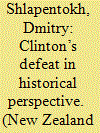

|
|
|
| 6 |
ID:
158192


|
|
|
|
|
| Summary/Abstract |
Politicians can sometimes make absolutely outrageous statements without even realizing it. This was, for example, the case with Emmanuel Macron, French President. During a joint press conference with Russian President Vladimir Putin in France in May 2017, a Russian journalist asked Macron how his administration treated journalists and why journalists from Sputnik and Russia Today were treated in a discriminatory way. Macron refuted this accusation. He stated that his government provided free access to all honest and faithful journalists. Still, they should convey to their readers and viewers truth and not falsifications; not a lie which just appeared to be trusted.
|
|
|
|
|
|
|
|
|
|
|
|
|
|
|
|
| 7 |
ID:
122656
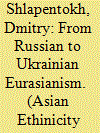

|
|
|
|
|
| Publication |
2013.
|
| Summary/Abstract |
Eurasianism is a popular creed in post-Soviet Russia. Its supporters believe Russia is a unique blend of Slavic and non-Slavic, mostly Muslim Turkic people. With the rise of Russian nationalism, Muslims were transformed into enemies. It has been a different story in Ukraine, where Russians - 'the old brothers' - became an alien force and Turkic people an acceptable minority. This trend has held for the last 20 years regardless of all vacillations in Ukrainian political/cultural development.
|
|
|
|
|
|
|
|
|
|
|
|
|
|
|
|
| 8 |
ID:
099553


|
|
|
| 9 |
ID:
082496


|
|
|
| 10 |
ID:
092408
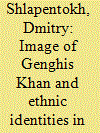

|
|
|
|
|
| Publication |
2009.
|
| Summary/Abstract |
The recent rise of Asia as a global geopolitical center has led to renewed interest in Asian history, not just by Asians but by Europeans as well. Genghis Khan is one of those figures who attracts attention, and several movies on him have recently been created. One of them was made in Russia and has led to broad public response. These responses have made it possible to gauge the views of the Russian public on the role of Russia in the global community and the relationship between Russians and ethnic minorities of the Russian Federation.
|
|
|
|
|
|
|
|
|
|
|
|
|
|
|
|
| 11 |
ID:
180392
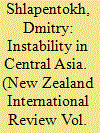

|
|
|
|
|
| Summary/Abstract |
Tajikistan, one of the poorest former Soviet republics, was wracked by a brutal civil war in 1990. By some estimates, more than 100,000 people were killed. After the end of this bloody conflict, the republic was still unstable, especially with the great influence of Islamism. The prison revolt last year indicates that an Islamist uprising could well spread. This has forced Emomali Rakhmon, the president, to think about his personal security. In the event of a rebel victory, he would have very few countries where he could take refuge. Russia is among them.
|
|
|
|
|
|
|
|
|
|
|
|
|
|
|
|
| 12 |
ID:
134931


|
|
|
|
|
| Summary/Abstract |
In the summer of 2010 a few young men from the Maritime Provinces in Russia engaged in the systematic killing of several policemen. The event looks trivial in the context of recent Russian history marked by the spread of violent crime. Still, it is potentially a quite important event. Unlike ordinary criminals, those who took part in the murders were motivated by political ideology. They regarded the entire post-Soviet state as oppressive and were ready to die fighting it. The event has another important implication - the fighters were ethnic Russian rather than members of Muslim minorities and they were supported by a majority of the local population. The event indicated the potential emergence of a new centre of terrorist activity far away from the northern Caucasus and Volga region, as well as raising the spectre of the Russian Far East splitting away from the Russian Federation.
|
|
|
|
|
|
|
|
|
|
|
|
|
|
|
|
| 13 |
ID:
184599


|
|
|
|
|
| Summary/Abstract |
Several seemingly mutually-disconnected and contradictory processes can be discerned in Kazakhstan. On one hand, relations between Nur-Sultan (Astana) and Moscow have worsened visibly, despite both being part of the Eurasian Union. Some Russian politicians insist that Kazakhstan is an artificial state, created by the Soviet regime, or that northern parts of the country are actually part of Siberia. Nur-Sultan vehemently denied these statements and arrested ethnic Kazakh intellectuals advocating close ties with Russia. At the same time, the Kazakh elite sent a peculiar message, wrapped in historical allusions, that they had no issue with Kazakhstan's Russians, and wanted their peaceful assimilation. The recent violence has sped up the process.
|
|
|
|
|
|
|
|
|
|
|
|
|
|
|
|
| 14 |
ID:
184586


|
|
|
|
|
| Summary/Abstract |
On 24 February Russia invaded Ukraine, an act of aggression condemned by a large majority of members of the United Nations. The roots of this invasion lie in a particular perception of Russian and Ukrainian history held by Russian President Vladimir Putin. In an article he penned last year, he held that Ukrainians and Russians are the same people, and that Ukraine should look to Russia rather than the West. Although there is no question that the two countries have long been closely associated, Putin ignored facts which did not fit into the model of the friendly relationship between Russians and Ukrainians.
|
|
|
|
|
|
|
|
|
|
|
|
|
|
|
|
| 15 |
ID:
134552


|
|
|
|
|
| Summary/Abstract |
Germany would not “divorce” the U.S. to embrace Russia. Still, a monogamous relationship between Washington and Berlin could well be transformed to a peculiar menage a trois, in which Moscow could find its role in sharing influence and possibly even domination in East/Central European space.
|
|
|
|
|
|
|
|
|
|
|
|
|
|
|
|
| 16 |
ID:
096408


|
|
|
| 17 |
ID:
166109


|
|
|
|
|
| Summary/Abstract |
Dmitry Shlapentokh discusses the constructed reality that he perceives underpinning the American economy.
|
|
|
|
|
|
|
|
|
|
|
|
|
|
|
|
| 18 |
ID:
132707
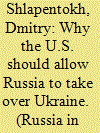

|
|
|
|
|
| Publication |
2014.
|
| Summary/Abstract |
The U.S. should follow the British wise policy of the early 20th century which implies the accommodation and sharing of power with an adversary. Reality would impose this transition anyway.
|
|
|
|
|
|
|
|
|
|
|
|
|
|
|
|